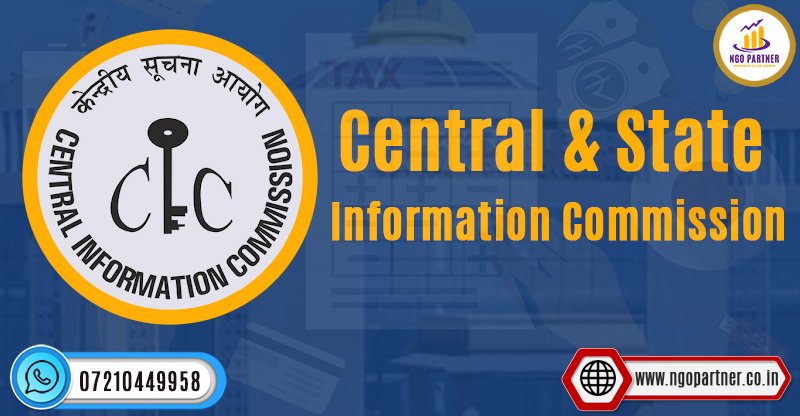
- June 16, 2023
- NGO Partner
- 0 Comments
- 708 Views
- 0 Likes
- Marketing Company Blogs
Central and State Information Commissions are integral pillars
Central and State Information Commissions
Central and State Information Commissions are integral pillars of the Right to Information (RTI) framework, ensuring transparency, accountability, and citizen empowerment. As independent authorities, they play a crucial role in resolving disputes, appeals, and complaints related to the access and disclosure of information. In this blog post, we will delve into the functions, powers, and significance of both the Central and State Information Commissions, shedding light on their roles in promoting transparent governance.

The Central Information Commission (CIC) is the apex body responsible for overseeing the implementation of the RTI Act at the central level. It handles appeals and complaints against decisions made by public authorities and ensures compliance with the RTI Act. On the other hand, State Information Commissions (SICs) operate at the state level, mirroring the functions of the CIC within their respective states.
The history of Information Commissions can be traced back to the enactment of the RTI Act in India in 2005, which recognized the need for transparent governance and citizen participation. Since then, these commissions have played a vital role in upholding the principles of the RTI and safeguarding the rights of citizens.
This blog post aims to provide an overview of the Central and State Information Commissions, exploring their composition, powers, responsibilities, and challenges. By understanding the roles of these commissions, we can appreciate their significance in ensuring transparent governance, empowering citizens, and fostering a culture of accountability.
Understanding the Central Information Commission (CIC)
Overview and Jurisdiction:
The Central Information Commission (CIC) is the apex body responsible for implementing and enforcing the Right to Information (RTI) Act at the central level in India. It serves as an independent authority that ensures transparency, accountability, and citizen empowerment. The CIC has jurisdiction over public authorities at the central level, including government departments, ministries, public sector undertakings, and other organizations funded by the government.
Composition and Appointment of Information Commissioners:
The CIC consists of a Chief Information Commissioner (CIC) and Information Commissioners (ICs) appointed by the President of India. The Chief Information Commissioner is the head of the Commission, while the Information Commissioners assist in the functioning of the CIC. The appointment process involves recommendations from a committee comprising the Prime Minister, Leader of Opposition, and a Union Cabinet Minister.
Functions and Powers:
The CIC has various functions and powers to ensure the effective implementation of the RTI Act. It adjudicates on complaints and appeals filed by individuals who have been denied access to information or are dissatisfied with the response received from public authorities. The CIC has the authority to summon public officials, examine witnesses, and inspect government offices and records. It can also impose penalties on public officials for non-compliance with the RTI Act.
State Information Commissions (SICs)
Role and Significance:
State Information Commissions (SICs) operate at the state level and mirror the functions of the CIC within their respective states. They play a crucial role in promoting transparency, accountability, and citizen empowerment by ensuring the implementation of the RTI Act at the state level.
Composition and Appointment Process:
The composition of SICs is similar to the CIC, with a State Chief Information Commissioner (SCIC) and State Information Commissioners (SICs). The Governor of the state appoints these commissioners based on recommendations from a committee comprising the Chief Minister, the Leader of Opposition, or the Leader of the largest Opposition party.
Powers and Functions:
SICs have powers and functions similar to those of the CIC. They adjudicate on appeals and complaints related to the RTI Act filed by individuals within their respective states. SICs can summon public officials, examine witnesses, and inspect government offices and records. They also have the authority to impose penalties for non-compliance with the RTI Act.
Key Responsibilities and Functions of Central and State Information Commissions
Resolving RTI Appeals and Disputes:
One of the primary responsibilities of both the CIC and SICs is to resolve appeals and disputes related to the RTI Act. They provide a platform for individuals to seek redressal when their right to information has been denied or when they are dissatisfied with the response received from public authorities.
Ensuring Compliance with the RTI Act:
The CIC and SICs are responsible for ensuring compliance with the provisions of the RTI Act. They monitor the implementation of the Act, conduct investigations, and take necessary actions to ensure that public authorities fulfill their obligations regarding transparency and disclosure of information.
Promoting Transparency and Accountability:
The CIC and SICs play a crucial role in promoting transparency and accountability in governance. By resolving RTI appeals and disputes, they empower citizens to access information held by public authorities. This, in turn, fosters transparency, facilitates informed decision-making, and holds government officials accountable for their actions.
Powers of Central and State Information Commissions
Summoning and Enforcing Attendance:
Imagine having the power to summon government officials and ensure their attendance. Well, that’s exactly what the Central and State Information Commissions can do! When investigating a case or hearing an appeal, they have the authority to summon public officials to provide testimony or present evidence. This power ensures that the truth is revealed and accountability is upheld.
Examination of Witnesses:
The drama unfolds as the Central and State Information Commissions examine witnesses under oath. Like a courtroom scene from a gripping legal thriller, these commissions can cross-examine witnesses to extract crucial information and uncover hidden facts. Witness testimonies play a vital role in determining the truth and delivering justice, making this power a formidable weapon in the fight for transparency.
Inspection of Government Offices and Records:
The Central and State Information Commissions don’t shy away from rolling up their sleeves and diving into the depths of government offices and records. Armed with the power to inspect these sacred repositories of information, they ensure that no stone is left unturned in the pursuit of truth. By examining official documents and records, they can uncover hidden information and expose any attempts to withhold or manipulate data.
Challenges and Limitations
Backlog of Cases:
Behind the scenes, the Central and State Information Commissions face a daunting challenge—a mountainous backlog of cases awaiting resolution. With an ever-increasing number of appeals and complaints, these commissions struggle to keep up with the demand for justice. However, efforts are being made to streamline the process and reduce the backlog, ensuring timely resolution of cases.
Lack of Awareness and Resources:
In this complex world, knowledge is power. Yet, many citizens remain unaware of their rights under the RTI Act, leading to underutilization of the commissions. Additionally, limited resources pose a challenge to the efficient functioning of these commissions. Adequate awareness campaigns and sufficient allocation of resources are essential to bridge these gaps.
Independence and Autonomy:
Maintaining independence and autonomy is crucial for the effective functioning of the Central and State Information Commissions. However, there have been concerns regarding external influence or political pressure that may hinder their ability to make impartial decisions. Safeguarding their independence and autonomy is vital to ensure the integrity of their judgments and maintain public trust.
Strengthening the Central and State Information Commissions
Increasing Efficiency and Timeliness:
To tackle the challenge of a backlog of cases, it is essential to enhance the efficiency and timeliness of the decision-making process. This can be achieved through the adoption of streamlined procedures, leveraging technology for faster processing, and providing adequate support staff to the commissions.
Enhancing Public Outreach and Awareness
Empowering citizens begins with awareness. Efforts should be made to educate and inform the public about the RTI Act and the role of the Central and State Information Commissions. Public outreach programs, awareness campaigns, and collaborations with civil society organizations can help bridge the gap between the commissions and the citizens they serve.
Ensuring Independence and Autonomy
To maintain the integrity and impartiality of the Central and State Information Commissions, measures must be taken to safeguard their independence and autonomy. This includes enacting legislation to insulate them from external influence, ensuring transparent and merit-based appointments, and establishing mechanisms for accountability and oversight.
In conclusion, the Central and State Information Commissions stand as guardians of transparency, accountability, and citizen empowerment. With their powers to summon, examine witnesses, and inspect records, they ensure the truth prevails. Despite challenges such as backlog of cases and lack of awareness, efforts to strengthen these commissions are underway. Landmark judgments and decisions have empowered citizens, curbed corruption, and strengthened democratic governance. To dive deeper into the world of transparency, governance, and citizen rights, we invite you to explore more blogs on our site. Together, let us embrace transparency, foster accountability, and build a society that thrives on the power of information.
Related: Right to Constitutional Remedies
Feel free to share you views about this article in the comment section below and share this article in your friend circle to increase awareness. For any query you can easily contact us from the details below.
Contact number : 7210449958
Email id : info@ngopartner.co.in




Leave a Comment